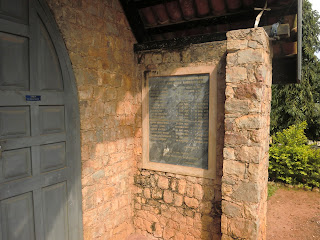
I guess we are "official." We received these shirts made of fabric with the ACI logo that all of the staff wear. The purpose is to create a sense of community among the staff and also not to differentiate among staff by what they wear. ACI works very hard at building a sense of teamwork and valuing the different gifts and contributions of everyone, whether they teach a course or mow the grass.
 These are four of the five full-time academic staff. From left to right: Dr. Mary Bediako teaches Primal Religions. Dr. Philip Laryea teaches African Theology. Dr. Ben Quarshie is the Rector of the Institute and teaches New Testament. Dr. Ernestina Afriyie teaches Gospel and Culture. The fifth staff member, Dr. Allison Howell, is from Australia and is currently home for a visit. Pray for these wonderful professors. They are teaching the future leaders of the world church!
These are four of the five full-time academic staff. From left to right: Dr. Mary Bediako teaches Primal Religions. Dr. Philip Laryea teaches African Theology. Dr. Ben Quarshie is the Rector of the Institute and teaches New Testament. Dr. Ernestina Afriyie teaches Gospel and Culture. The fifth staff member, Dr. Allison Howell, is from Australia and is currently home for a visit. Pray for these wonderful professors. They are teaching the future leaders of the world church!












